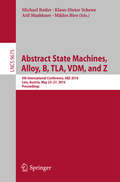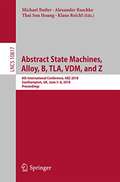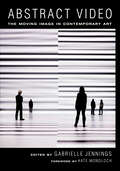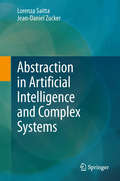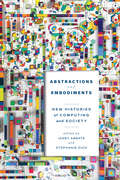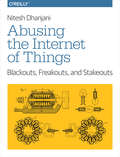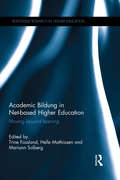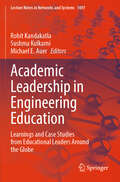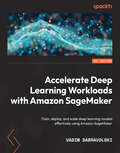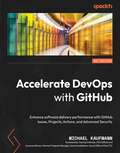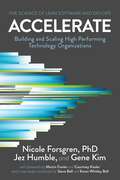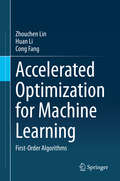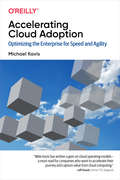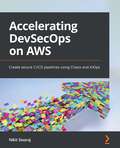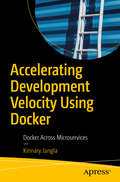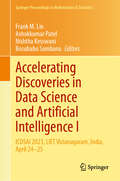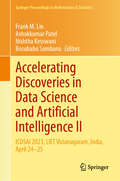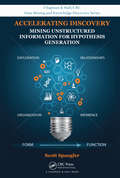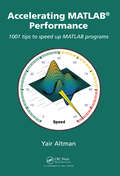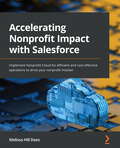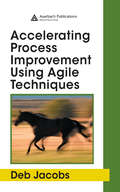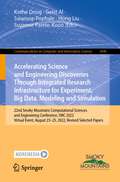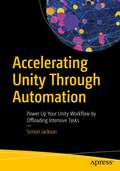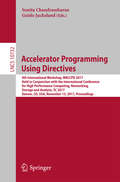- Table View
- List View
Abstract State Machines, Alloy, B, TLA, VDM, and Z: 5th International Conference, ABZ 2016, Linz, Austria, May 23-27, 2016, Proceedings (Lecture Notes in Computer Science #9675)
by Michael Butler Klaus-Dieter Schewe Atif Mashkoor Miklos BiroThis bookconstitutes the refereed proceedings of the 5th International Conference on AbstractState Machines, Alloy, B, TLA, VDM, and Z, ABZ 2016, held in Linz, Austria, inMay 2016. The 17 full and 15 short papers presented in this volume were carefullyreviewed and selected from 61 submissions. They record the latest researchdevelopments in state-based formal methods Abstract State Machines, Alloy, B,Circus, Event-B, TLS+, VDM and Z.
Abstract State Machines, Alloy, B, TLA, VDM, and Z: 5th International Conference, Abz 2016, Linz, Austria, May 23-27, 2016, Proceedings (Lecture Notes in Computer Science #9675)
by Michael Butler Atif Mashkoor Miklos Biro Laus-Dieter ScheweThis book constitutes the refereed proceedings of the 5th International Conference on Abstract State Machines, Alloy, B, TLA, VDM, and Z, ABZ 2016, held in Linz, Austria, in May 2016. <P><P> The 17 full and 15 short papers presented in this volume were carefully reviewed and selected from 61 submissions. They record the latest research developments in state-based formal methods Abstract State Machines, Alloy, B, Circus, Event-B, TLS+, VDM and Z.
Abstract Video: The Moving Image in Contemporary Art
by Gabrielle JenningsOffering historical and theoretical positions from a variety of art historians, artists, curators, and writers, this groundbreaking collection is the first substantive sourcebook on abstraction in moving-image media. With a particular focus on art since 2000, Abstract Video addresses a longer history of experimentation in video, net art, installation, new media, expanded cinema, visual music, and experimental film. Editor Gabrielle Jennings—a video artist herself—reveals as never before how works of abstract video are not merely, as the renowned curator Kirk Varnedoe once put it, "pictures of nothing," but rather amorphous, ungovernable spaces that encourage contemplation and innovation. In explorations of the work of celebrated artists such as Jeremy Blake, Mona Hatoum, Pierre Huyghe, Ryoji Ikeda, Takeshi Murata, Diana Thater, and Jennifer West, alongside emerging artists, this volume presents fresh and vigorous perspectives on a burgeoning and ever-changing arena of contemporary art.
Abstraction in Artificial Intelligence and Complex Systems
by Jean-Daniel Zucker Lorenza SaittaAbstraction is a fundamental mechanism underlying both human and artificial perception, representation of knowledge, reasoning and learning. This mechanism plays a crucial role in many disciplines, notably Computer Programming, Natural and Artificial Vision, Complex Systems, Artificial Intelligence and Machine Learning, Art, and Cognitive Sciences. This book first provides the reader with an overview of the notions of abstraction proposed in various disciplines by comparing both commonalities and differences. After discussing the characterizing properties of abstraction, a formal model, the KRA model, is presented to capture them. This model makes the notion of abstraction easily applicable by means of the introduction of a set of abstraction operators and abstraction patterns, reusable across different domains and applications. It is the impact of abstraction in Artificial Intelligence, Complex Systems and Machine Learning which creates the core of the book. A general framework, based on the KRA model, is presented, and its pragmatic power is illustrated with three case studies: Model-based diagnosis, Cartographic Generalization, and learning Hierarchical Hidden Markov Models.
Abstractions and Embodiments: New Histories of Computing and Society (Studies in Computing and Culture)
by Janet Abbate and Stephanie DickCutting-edge historians explore ideas, communities, and technologies around modern computing to explore how computers mediate social relations.Computers have been framed both as a mirror for the human mind and as an irreducible other that humanness is defined against, depending on different historical definitions of "humanness." They can serve both liberation and control because some people's freedom has historically been predicated on controlling others. Historians of computing return again and again to these contradictions, as they often reveal deeper structures.Using twin frameworks of abstraction and embodiment, a reformulation of the old mind-body dichotomy, this anthology examines how social relations are enacted in and through computing. The authors examining "Abstraction" revisit central concepts in computing, including "algorithm," "program," "clone," and "risk." In doing so, they demonstrate how the meanings of these terms reflect power relations and social identities. The section on "Embodiments" focuses on sensory aspects of using computers as well as the ways in which gender, race, and other identities have shaped the opportunities and embodied experiences of computer workers and users. Offering a rich and diverse set of studies in new areas, the book explores such disparate themes as disability, the influence of the punk movement, working mothers as technical innovators, and gaming behind the Iron Curtain. Abstractions and Embodiments reimagines computing history by questioning canonical interpretations, foregrounding new actors and contexts, and highlighting neglected aspects of computing as an embodied experience. It makes the profound case that both technology and the body are culturally shaped and that there can be no clear distinction between social, intellectual, and technical aspects of computing. Contributors: Janet Abbate, Marc Aidinoff, Troy Kaighin Astarte, Ekaterina Babinsteva, André Brock, Maarten Bullynck, Jiahui Chan, Gerardo Con Diaz, Liesbeth De Mol, Stephanie Dick, Kelcey Gibbons, Elyse Graham, Michael J. Halvorson, Mar Hicks, Scott Kushner, Xiaochang Li, Zachary Loeb, Lisa Nakamura, Tiffany Nichols, Laine Nooney, Elizabeth Petrick, Cierra Robson, Hallam Stevens, Jaroslav Švelch
Abuse: An Encyclopedia Of Causes, Consequences, And Treatments
by Rosemarie SkaineAbuse, a key theme of health education curricula, is also a major issue faced by many segments of society. Intended for high school students as well as undergraduates and the general reader, this comprehensive encyclopedia explores abuse in all its forms--physical, sexual, emotional, and verbal--among a variety of age and demographic groups from children to the elderly to the disabled. It sheds light on causes and symptoms of abuse, examines lasting impacts, and suggests avenues for prevention and treatment. <P><P> Specific topics of concern to a secondary school audience include bullying and cyberbullying; abuse of those in same-sex relationships; and sexual abuse through rape, date rape, incest, and sexting. Elder abuse, which has become of greater concern as our society ages, is covered, as are domestic abuse, child abuse, and abduction. Through up-to-date entries by expert contributors, readers will learn about the causes and results of specific types of abuse, as well as their legal and sociological dimensions. The title will also serve as a gateway to further study--and as a resource for readers seeking help.
Abusing the Internet of Things: Blackouts, Freakouts, and Stakeouts
by Nitesh DhanjaniThis book is a marvellous thing: an important intervention in the policy debate about information security and a practical text for people trying to improve the situation.— Cory Doctorowauthor, co-editor of Boing BoingA future with billions of connected "things" includes monumental security concerns. This practical book explores how malicious attackers can abuse popular IoT-based devices, including wireless LED lightbulbs, electronic door locks, baby monitors, smart TVs, and connected cars.If you’re part of a team creating applications for Internet-connected devices, this guide will help you explore security solutions. You’ll not only learn how to uncover vulnerabilities in existing IoT devices, but also gain deeper insight into an attacker’s tactics.Analyze the design, architecture, and security issues of wireless lighting systemsUnderstand how to breach electronic door locks and their wireless mechanismsExamine security design flaws in remote-controlled baby monitorsEvaluate the security design of a suite of IoT-connected home productsScrutinize security vulnerabilities in smart TVsExplore research into security weaknesses in smart carsDelve into prototyping techniques that address security in initial designsLearn plausible attacks scenarios based on how people will likely use IoT devices
Academic Bildung in Net-based Higher Education: Moving beyond learning (Routledge Research in Higher Education)
by Trine Fossland Helle Mathiasen Mariann SolbergThe explosive emergence of net-based learning in higher education brings with it new possibilities and constraints in teaching and learning environments.This edited collection considers how the concept of Academic Bildung - a term suggesting a personal educational process beyond actual educational learning - can be applied to net-based higher education. The book is drawing on Scandinavian research to address the topic from both a theoretical and practical standpoint.Chapters explore the facilitation of online courses and argue how and why universities should involve dimensions of Academic Bildung on both a strategic and technological pedagogical content level. The book is structured in three parts: Part I frames the current state of net-based learning and introduces Bildung as a concept; Part II contains a set of four case studies in Norway, Sweden and Denmark, also including a fifth study that looks at Scandinavian approaches to teaching and learning in comparison with data from the USA, the UK, Australia and Canada; Part III provides a synthesis of theories and cases to examine whether a Scandinavian orientation can be discerned. Contributions suggest that in order to address one of the fundamental functions of higher education, the ability to produce new knowledge, the Academic Bildung of the students has to be in focus. Grounded in theoretical and empirical discussion, this book will appeal to researchers and academics in the field of higher education as well as personnel who work with teaching and learning with technology, and academics interested in the question of Academic Bildung.
Academic Leadership in Engineering Education: Learnings and Case Studies from Educational Leaders Around the Globe (Lecture Notes in Networks and Systems #1097)
by Michael E. Auer Rohit Kandakatla Sushma KulkarniEngineering institutions worldwide are undergoing significant transformation as they work to adapt themselves to the learning needs of students in the 21st century, changing trends in the requirements of the industry and society, and growing concerns about issues related to sustainable development and climate change. Future engineering graduates must be equipped to tackle complex problems in society that are aligned with the United Nation’s Sustainable Development Goals (SDGs). There are increasing calls for engineering institutions to create quality learning experiences for students, enabling them to develop deeper learning skills such as critical thinking, problem-solving, life-long learning, leadership skills, and the ability to work in teams. Engineering curricula must be made multidisciplinary, innovative, and outcome-driven by integrating evidence-based pedagogies and learning mechanisms. For this to happen, academic leaders must reimagine their institutions with significant changes at the administration, governance, and leadership levels. Establishing new-age institutions that meet international accreditation standards requires dynamic academic leaders at multiple levels who can work collaboratively to achieve the vision and mission of the institution. This book is an attempt to share key learnings from academic leaders from around the world on important trends emerging in engineering education. Aspiring academic leaders will get a glimpse of the thought process and vision of such leaders, how they strategize and support their institutions for the betterment of the students, and what kind of changes they are working on to keep up with the ever-evolving environment. The book is divided into four sections. Each section comprises multiple chapters written by different academic leaders that are based on their experiences of implementing best practices at their respective institutions. Section 1 - Governance and Leadership of Engineering Institutions Section 2 - Creating Quality Learning Experiences Section 3 - Preparing Institutions to become Knowledge Hubs for Research, Innovation, and Entrepreneurship Section 4 - Empowerment of Faculty and Students for the 21st Century The sections and chapters will be of great value to multiple stakeholders in leadership positions at engineering institutions including Presidents, Vice-Chancellors, Provosts, Directors, Deans, Heads of Departments and Faculty members aspiring to be academic leaders. Each chapter will be presented through case studies from successful programs initiated and pioneered at various engineering institutions across the globe.
Accelerate Deep Learning Workloads with Amazon SageMaker: Train, deploy, and scale deep learning models effectively using Amazon SageMaker
by Vadim DabravolskiPlan and design model serving infrastructure to run and troubleshoot distributed deep learning training jobs for improved model performance.Key FeaturesExplore key Amazon SageMaker capabilities in the context of deep learningTrain and deploy deep learning models using SageMaker managed capabilities and optimize your deep learning workloadsCover in detail the theoretical and practical aspects of training and hosting your deep learning models on Amazon SageMakerBook DescriptionOver the past 10 years, deep learning has grown from being an academic research field to seeing wide-scale adoption across multiple industries. Deep learning models demonstrate excellent results on a wide range of practical tasks, underpinning emerging fields such as virtual assistants, autonomous driving, and robotics. In this book, you will learn about the practical aspects of designing, building, and optimizing deep learning workloads on Amazon SageMaker. The book also provides end-to-end implementation examples for popular deep-learning tasks, such as computer vision and natural language processing. You will begin by exploring key Amazon SageMaker capabilities in the context of deep learning. Then, you will explore in detail the theoretical and practical aspects of training and hosting your deep learning models on Amazon SageMaker. You will learn how to train and serve deep learning models using popular open-source frameworks and understand the hardware and software options available for you on Amazon SageMaker. The book also covers various optimizations technique to improve the performance and cost characteristics of your deep learning workloads.By the end of this book, you will be fluent in the software and hardware aspects of running deep learning workloads using Amazon SageMaker.What you will learnCover key capabilities of Amazon SageMaker relevant to deep learning workloadsOrganize SageMaker development environmentPrepare and manage datasets for deep learning trainingDesign, debug, and implement the efficient training of deep learning modelsDeploy, monitor, and optimize the serving of DL modelsWho this book is forThis book is relevant for ML engineers who work on deep learning model development and training, and for Solutions Architects who design and optimize end-to-end deep learning workloads. It assumes familiarity with the Python ecosystem, principles of Machine Learning and Deep Learning, and basic knowledge of the AWS cloud.
Accelerate DevOps with GitHub: Enhance software delivery performance with GitHub Issues, Projects, Actions, and Advanced Security
by Michael Kaufmann Thomas Dohmke Donovan BrownTake your DevOps and DevSecOps game to the next level by leveraging the power of the GitHub toolset in practiceKey FeaturesRelease software faster and with confidenceIncrease your productivity by spending more time on software delivery and less on fixing bugs and administrative tasksDeliver high-quality software that is more stable, scalable, and secureBook DescriptionThis practical guide to DevOps uses GitHub as the DevOps platform and shows how you can leverage the power of GitHub for collaboration, lean management, and secure and fast software delivery. The chapters provide simple solutions to common problems, thereby helping teams that are already on their DevOps journey to further advance into DevOps and speed up their software delivery performance. From finding the right metrics to measure your success to learning from other teams' success stories without merely copying what they've done, this book has it all in one place. As you advance, you'll find out how you can leverage the power of GitHub to accelerate your value delivery – by making work visible with GitHub Projects, measuring the right metrics with GitHub Insights, using solid and proven engineering practices with GitHub Actions and Advanced Security, and moving to event-based and loosely coupled software architecture. By the end of this GitHub book, you'll have understood what factors influence software delivery performance and how you can measure your capabilities, thus realizing where you stand in your journey and how you can move forward.What you will learnEffectively measure software delivery performanceAdopt DevOps and lean management techniques in your teamsPlan, track, and visualize your work using GitHub Issues and ProjectsUse continuous delivery with GitHub Actions and PackagesScale quality through testing in production and chaos engineering“Shift left” security and secure your entire software supply chainUse DevSecOps practices with GitHub Advanced SecuritySecure your code with code scanning, secret scanning, and DependabotWho this book is forThis book is for developers, solutions architects, DevOps engineers, and SREs, as well as for engineering or product managers who want to enhance their software delivery performance. Whether you're new to DevOps, already have experience with GitHub Enterprise, or come from a platform such as Azure DevOps, Team Foundation Server, GitLab, Bitbucket, Puppet, Chef, or Jenkins but struggle to achieve maximum performance, you'll find this book beneficial.
Accelerate: The Science of Lean Software and DevOps: Building and Scaling High Performing Technology Organizations
by Jez Humble Gene Kim Nicole Forsgren, PhDWinner of the Shingo Publication AwardAccelerate your organization to win in the marketplace.How can we apply technology to drive business value? For years, we've been told that the performance of software delivery teams doesn't matter―that it can't provide a competitive advantage to our companies. Through four years of groundbreaking research to include data collected from the State of DevOps reports conducted with Puppet, Dr. Nicole Forsgren, Jez Humble, and Gene Kim set out to find a way to measure software delivery performance―and what drives it―using rigorous statistical methods. This book presents both the findings and the science behind that research, making the information accessible for readers to apply in their own organizations.Readers will discover how to measure the performance of their teams, and what capabilities they should invest in to drive higher performance. This book is ideal for management at every level.
Accelerated Optimization for Machine Learning: First-Order Algorithms
by Zhouchen Lin Huan Li Cong FangThis book on optimization includes forewords by Michael I. Jordan, Zongben Xu and Zhi-Quan Luo. Machine learning relies heavily on optimization to solve problems with its learning models, and first-order optimization algorithms are the mainstream approaches. The acceleration of first-order optimization algorithms is crucial for the efficiency of machine learning. Written by leading experts in the field, this book provides a comprehensive introduction to, and state-of-the-art review of accelerated first-order optimization algorithms for machine learning. It discusses a variety of methods, including deterministic and stochastic algorithms, where the algorithms can be synchronous or asynchronous, for unconstrained and constrained problems, which can be convex or non-convex. Offering a rich blend of ideas, theories and proofs, the book is up-to-date and self-contained. It is an excellent reference resource for users who are seeking faster optimization algorithms, as well as for graduate students and researchers wanting to grasp the frontiers of optimization in machine learning in a short time.
Accelerating Cloud Adoption
by Michael KavisMany companies move workloads to the cloud only to encounter issues with legacy processes and organizational structures. How do you design new operating models for this environment? This practical book shows IT managers, CIOs, and CTOs how to address the hardest part of any cloud transformation: the people and the processes.Author Mike Kavis (Architecting the Cloud) explores lessons learned from enterprises in the midst of cloud transformations. You'll learn how to rethink your approach from a technology, process, and organizational standpoint to realize the promise of cost optimization, agility, and innovation that public cloud platforms provide.Learn the difference between working in a data center and operating in the cloudExplore patterns and anti-patterns for organizing cloud operating modelsGet best practices for making the organizational change required for a move to the cloudUnderstand why site reliability engineering is essential for cloud operationsImprove organizational performance through value stream mapping
Accelerating DevSecOps on AWS: Create secure CI/CD pipelines using Chaos and AIOps
by Nikit SwarajBuild high-performance CI/CD pipelines that are powered by AWS and the most cutting-edge tools and techniquesKey FeaturesMaster the full AWS developer toolchain for building high-performance, resilient, and powerful CI/CD pipelinesGet to grips with Chaos engineering, DevSecOps, and AIOps as applied to CI/CDEmploy the latest tools and techniques to build a CI/CD pipeline for application and infrastructureBook DescriptionContinuous integration and continuous delivery (CI/CD) has never been simple, but these days the landscape is more bewildering than ever; its terrain riddled with blind alleys and pitfalls that seem almost designed to trap the less-experienced developer. If you're determined enough to keep your balance on the cutting edge, this book will help you navigate the landscape with ease. This book will guide you through the most modern ways of building CI/CD pipelines with AWS, taking you step-by-step from the basics right through to the most advanced topics in this domain.The book starts by covering the basics of CI/CD with AWS. Once you're well-versed with tools such as AWS Codestar, Proton, CodeGuru, App Mesh, SecurityHub, and CloudFormation, you'll focus on chaos engineering, the latest trend in testing the fault tolerance of your system. Next, you'll explore the advanced concepts of AIOps and DevSecOps, two highly sought-after skill sets for securing and optimizing your CI/CD systems. All along, you'll cover the full range of AWS CI/CD features, gaining real-world expertise.By the end of this AWS book, you'll have the confidence you need to create resilient, secure, and performant CI/CD pipelines using the best techniques and technologies that AWS has to offer.What you will learnUse AWS Codestar to design and implement a full branching strategyEnforce Policy as Code using CloudFormation Guard and HashiCorp SentinelMaster app and infrastructure deployment at scale using AWS Proton and review app code using CodeGuruDeploy and manage production-grade clusters using AWS EKS, App Mesh, and X-RayHarness AWS Fault Injection Simulator to test the resiliency of your appWield the full arsenal of AWS Security Hub and Systems Manager for infrastructure security automationEnhance CI/CD pipelines with the AI-powered DevOps Guru serviceWho this book is forThis book is for DevOps engineers, engineering managers, cloud developers, and cloud architects. Basic experience with the software development life cycle, DevOps, and AWS is all you need to get started.
Accelerating Development Velocity Using Docker: Docker Across Microservices
by Kinnary JanglaDiscover how a software engineer can leverage Docker in order to expedite development velocity. This book focuses on the fundamental concepts this program is built upon and explores how it can help you get your services up and running inside Docker containers. You'll also review tips on how to debug microservices applications that run inside Docker containers.Tech companies are now developing complex softwares that are comprised of multiple services running on different platforms, and Docker has become an essential part of coordinating the communication between these services and platforms. This book addresses problems caused by drifting microservices, debugging across services, inconsistent environments across machines, and coordinating development of machine learning systems between a team of developers, etc. Accelerating Development Velocity Using Docker puts you on the path to transforming your complex systems into more efficient ones.What You'll LearnSetup Docker and employ quick solutions to road blocksReview challenges associated with debugging microservices that sit behind a complex applicationLeverage Docker features to seamlessly get multiple microservices up and runningDebug inside a Docker containerReview advanced use cases of Docker that can help consistency of development environments· Who This Book Is ForIdeal for new to mid-level infrastructure engineers who want to learn how to make their development environments efficient across their and cross teams, or for students who aspire to learn basics of how to debug distributed systems and how to develop efficient applications.
Accelerating Discoveries in Data Science and Artificial Intelligence I: ICDSAI 2023, LIET Vizianagaram, India, April 24–25 (Springer Proceedings in Mathematics & Statistics #421)
by Nishtha Kesswani Frank M. Lin Ashokkumar Patel Bosubabu SambanaThe Volume 1 book on Accelerating Discoveries in Data Science and Artificial Intelligence (Proceedings of ICDSAI 2023), that was held on April 24-25, 2023 by CSUSB USA, the International Association of Academicians (IAASSE), and the Lendi Institute of Engineering and Technology, Vizianagaram, India is intended to be used as a reference book for researchers and practitioners in the disciplines of AI and data science. The book introduces key topics and algorithms and explains how these contribute to healthcare, manufacturing, law, finance, retail, real estate, accounting, digital marketing, and various other fields. The book is primarily meant for academics, researchers, and engineers who want to employ data science techniques and AI applications to address real-world issues. Besides that, businesses and technology creators will also find it appealing to use in industry.
Accelerating Discoveries in Data Science and Artificial Intelligence II: ICDSAI 2023, LIET Vizianagaram, India, April 24–25 (Springer Proceedings in Mathematics & Statistics #438)
by Nishtha Kesswani Frank M. Lin Ashokkumar Patel Bosubabu SambanaThis edited volume on machine learning and big data analytics (Proceedings of ICDSAI 2023), that was held on April 24-25, 2023 by CSUSB USA, International Association of Academicians (IAASSE), and Lendi Institute of Engineering and Technology, Vizianagaram, India is intended to be used as a reference book for researchers and practitioners in the disciplines of AI and Data Science. With the fascinating development of technologies in several industries, there are numerous opportunities to develop innovative intelligence technologies to solve a wide range of uncertainties in various real-life problems. Researchers and academics have been drawn to building creative AI strategies by combining data science with classic mathematical methodologies. The book brings together leading researchers who wish to continue to advance the field and create a broad knowledge about the most recent research.
Accelerating Discovery: Mining Unstructured Information for Hypothesis Generation (Chapman & Hall/CRC Data Mining and Knowledge Discovery Series)
by Scott SpanglerUnstructured Mining Approaches to Solve Complex Scientific ProblemsAs the volume of scientific data and literature increases exponentially, scientists need more powerful tools and methods to process and synthesize information and to formulate new hypotheses that are most likely to be both true and important. Accelerating Discovery: Mining Unstructu
Accelerating MATLAB Performance: 1001 tips to speed up MATLAB programs
by Yair M. AltmanThe MATLAB programming environment is often perceived as a platform suitable for prototyping and modeling but not for "serious" applications. One of the main complaints is that MATLAB is just too slow. Accelerating MATLAB Performance aims to correct this perception by describing multiple ways to greatly improve MATLAB program speed. Packed with tho
Accelerating Nonprofit Impact with Salesforce: Implement Nonprofit Cloud for efficient and cost-effective operations to drive your nonprofit mission
by Melissa Hill DeesDrive digital transformation for nonprofits with well-organized volunteer management, donor engagement, fundraising, and grantmaking using the intelligent and powerful capabilities of Salesforce Nonprofit CloudKey FeaturesImplement NPSP modules to scale varied business operations in nonprofitsAdminister and automate business processes and tasks with NPSP for nonprofitsCustomize and extend the standard functionalities of Nonprofit Cloud and NPSP as per client needs, resources, and critical outcomesBook DescriptionSalesforce Nonprofit Cloud enables a 360-degree view of people related to your nonprofit to connect fundraising, program management, and grantmaking. With a single, unified view of every interaction with constituents, nonprofits can create strong relationships with the community and streamline internal processes. The book starts by covering the tools and features that make up Nonprofit Cloud, helping you understand their standard functionalities and how Nonprofit Success Pack's (NPSP) data architecture is critical to implementation. You'll learn how the Nonprofit Cloud Program Management Module can connect your programs, automate case management, and track client progress. Next, you'll explore the tools for creating a change management process to increase user adoption. Moving ahead, you'll understand how to configure necessary permissions for NPSP administration and explore how declarative tools help better align the goals of a nonprofit organization. Toward the concluding chapters, you'll cover customizations, deployment, custom reports, and dashboards for fundraising analytics, as well as best practices for data management to maintain its integrity. By the end of this Salesforce book, you'll be able to build and configure the Nonprofit Cloud for a variety of use cases to achieve maximum social impact with the least amount of technical debt.What you will learnImplement various components and modules in Nonprofit CloudImplement tools for grantmaking, program management, and case managementExtend the standard functionalities of Nonprofit Cloud and NPSPIdentify and use success metrics to prioritize goals and outcomes for implementationExplore the tools that Nonprofit Cloud offers for testing and deploymentBuild custom reports and dashboards for NPSP and use Tableau dashboard starters for fundraising analyticsUnderstand best practices for data management to maintain data accuracy and data integrityWho this book is forThis book is for technical consultants, functional consultants, and Salesforce architects who are working with nonprofit organizations and want to implement different functionalities within Nonprofit Cloud and NPSP optimally for business processes and tasks in their organizations. Salesforce administrator skills and overall proficiency with Salesforce are required to get the most out of this book.
Accelerating Process Improvement Using Agile Techniques
by Deb JacobsAccelerating Process Improvement Using Agile Techniques explains how agile programming is applied to standard process improvement. By applying agile techniques, IT organizations can speed up process improvement initiatives, minimize the resources these initiatives require, and maximize the benefits of process improvement. The book details st
Accelerating Science and Engineering Discoveries Through Integrated Research Infrastructure for Experiment, Big Data, Modeling and Simulation: 22nd Smoky Mountains Computational Sciences and Engineering Conference, SMC 2022, Virtual Event, August 23–25, 2022, Revised Selected Papers (Communications in Computer and Information Science #1690)
by Hong Liu Swaroop Pophale Suzanne Parete-Koon Kothe Doug Geist AlThis book constitutes the refereed proceedings of the 22nd Smoky Mountains Computational Sciences and Engineering Conference on Accelerating Science and Engineering Discoveries Through Integrated Research Infrastructure for Experiment, Big Data, Modeling and Simulation, SMC 2022, held virtually, during August 23–25, 2022. The 24 full papers included in this book were carefully reviewed and selected from 74 submissions. They were organized in topical sections as follows: foundational methods enabling science in an integrated ecosystem; science and engineering applications requiring and motivating an integrated ecosystem; systems and software advances enabling an integrated science and engineering ecosystem; deploying advanced technologies for an integrated science and engineering ecosystem; and scientific data challenges.
Accelerating Unity Through Automation: Power Up Your Unity Workflow by Offloading Intensive Tasks
by Simon JacksonBuilding games with Unity is hard enough without having to stand up and go and make a coffee each time you want to just build your project or find out days/weeks down the line that some change you made while building your dream has incurred a debt that means your project cannot be built for one of your target platforms without a lot of rework.Through automation, many of these hardships can be detected early and free up time and stress by monitoring your project as it is being created, identify risks and issues as you write the code, and free up your machine while lengthy build processes are running. The change might be hard, but once setup, it will give you peace of mind that everything you create will run, updates will be automatically managed, and your players are less likely to be drafting one-star reviews on your next publication.What You Will Learn• Build the automation of your dreams to accelerate your project• Get detailed examples for generating workflows tailored to your needs• Learn to save time and money by having a backend work for youWho Is This Book ForDevelopers having experience with Unity and interested in learning about (with no foreknowledge in) automation will greatly benefit from this book.
Accelerator Programming Using Directives: 4th International Workshop, WACCPD 2017, Held in Conjunction with the International Conference for High Performance (9783319748962 #10732)
by Sunita Chandrasekaran Guido JuckelandThis book constitutes the refereed post-conference proceedings of the 4th International Workshop on Accelerator Programming Using Directives, WACCPD 2017, held in Denver, CO, USA, in November 2017. <P><P> The 9 full papers presented have been carefully reviewed and selected from 14 submissions. The papers share knowledge and experiences to program emerging complex parallel computing systems. They are organized in the following three sections: applications; environments; and program evaluation.
